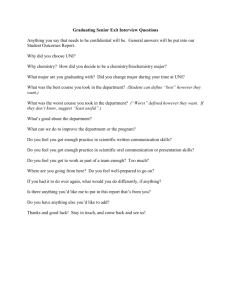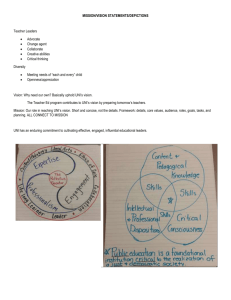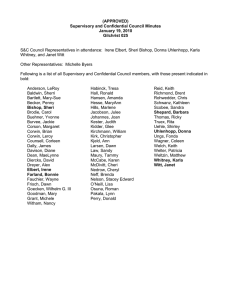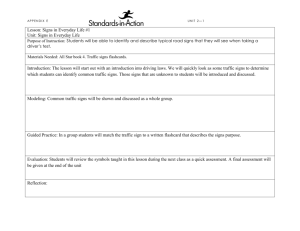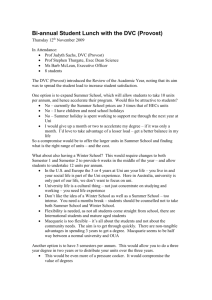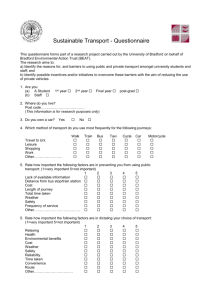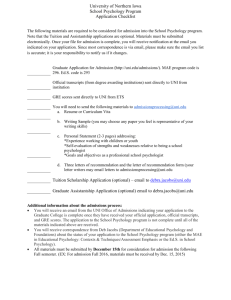Document 10718861
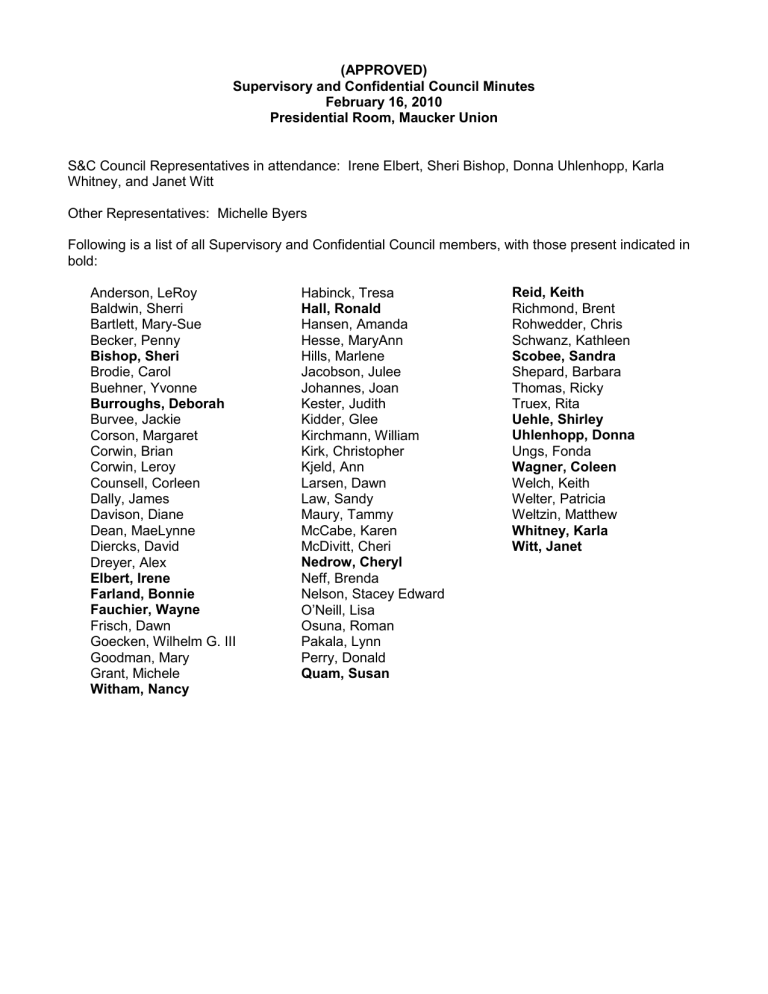
(APPROVED)
Supervisory and Confidential Council Minutes
February 16, 2010
Presidential Room, Maucker Union
S&C Council Representatives in attendance: Irene Elbert, Sheri Bishop, Donna Uhlenhopp, Karla
Whitney, and Janet Witt
Other Representatives: Michelle Byers
Following is a list of all Supervisory and Confidential Council members, with those present indicated in bold:
Anderson, LeRoy
Baldwin, Sherri
Bartlett, Mary-Sue
Becker, Penny
Bishop, Sheri
Brodie, Carol
Buehner, Yvonne
Burroughs, Deborah
Burvee, Jackie
Corson, Margaret
Corwin, Brian
Corwin, Leroy
Counsell, Corleen
Dally, James
Davison, Diane
Dean, MaeLynne
Diercks, David
Dreyer, Alex
Elbert, Irene
Farland, Bonnie
Fauchier, Wayne
Frisch, Dawn
Goecken, Wilhelm G. III
Goodman, Mary
Grant, Michele
Witham, Nancy
Habinck, Tresa
Hall, Ronald
Hansen, Amanda
Hesse, MaryAnn
Hills, Marlene
Jacobson, Julee
Johannes, Joan
Kester, Judith
Kidder, Glee
Kirchmann, William
Kirk, Christopher
Kjeld, Ann
Larsen, Dawn
Law, Sandy
Maury, Tammy
McCabe, Karen
McDivitt, Cheri
Nedrow, Cheryl
Neff, Brenda
Nelson, Stacey Edward
O ’Neill, Lisa
Osuna, Roman
Pakala, Lynn
Perry, Donald
Quam, Susan
Reid, Keith
Richmond, Brent
Rohwedder, Chris
Schwanz, Kathleen
Scobee, Sandra
Shepard, Barbara
Thomas, Ricky
Truex, Rita
Uehle, Shirley
Uhlenhopp, Donna
Ungs, Fonda
Wagner, Coleen
Welch, Keith
Welter, Patricia
Weltzin, Matthew
Whitney, Karla
Witt, Janet
1. Call to Order
Chair Irene Elbert called the meeting to order at 2 p.m.
2. Introduction of President Allen
President Allen updated the group on our UNI budget. He reviewed what had recently happened with our budget —for FY2010 we have had a 15% ($14 million) reduction in our budget. We have had a total reduction of budget of $23.5 million, a 25% decrease. UNI worked with the unions of
United Faculty and AFSCME to come to an agreement regarding mandatory unpaid days
(MUD)/furloughs/leaves of absence/salary reductions. The Governor and AFSCME struck a deal for the MUD. The MUD money does not come back to UNI, it goes to the Governor’s office. It is not part of our 10% savings. We will be short $700,000 and that money will be covered through other means. The Governor has submitted his proposed FY2011 budget. For FY2010 with the mandatory cuts, we have fallen below the mandatory federal level of funding, (which needs to match the 2006 level). This may result in the State returning a portion of the money to UNI. This must be approved by the legislature soon, and then signed by the Governor. We may know by
April if we will receive this money. The amount that we may receive is approximately $5.2 million.
President Allen will keep us posted. Legislature, in an effort to save money, may shorten their legislative session. It has been approved for UNI to have a tuition increase.
President Allen asked if there were any ideas of ways to save money at UNI. A suggestion was to change the way that the building/room temperatures are controlled. They are not being controlled accurately at this time. When temperatures are increased during the summer, this actually costs a lot more money, instead of saving utility costs. President Allen noted that it should be made sure that Tom Schellhart knows this. It was suggested that buildings should be shut down in the summer. One building suggested by physical plant employees was Lang; however, three S&C members noted that they work in that building throughout the entire year, including summer.
President Allen commented that with that in mind, Lang would not be an option to close in the summer. However, unused portions of the building could be shut down. One aspect to keep in mind, though, would not allow the humidity to get too high in those buildings. There are numerous other buildings that could be closed during the summer. It was suggested to have buildings at 68 degrees year round. For example, 12 large units run year round in the Education Center. In
Sabin, two of the three floors could be shut down. I t was suggested to have “hotel” offices for the summer. Room usage needs to be identified. President Allen felt that measures should be taken right away for savings. He will look at all available data on utility usage and make an attempt to reduce utilities across campus. The Physical plant has the data on classroom usage; however, maybe not the office room usage.
It was noted the President Obama wants higher education to reduce costs. UNI needs to look closely at where we can save money. It was suggested that shrinking the football scholarships for campus will save money.
UNI felt that the more an employee makes, the more that the employee should give back to UNI toward the 10% cut. However, the agreement AFSCME and the Governor made was more unpaid days for merit bargaining employees, than what UNI suggested. P&S and S&C employees are on target for their portion of the reduction; however, United Faculty is under target by 6%. This 6% will be covered by other means.
The college merger doesn’t tie into the budget cuts. This was done by the Provost to increase the effectiveness of programming. UNI is also looking at small enrollment in some courses.
President Allen stated he would rather see strategic cuts in an attempt to avoid temporary layoffs.
Hopefully, the economy will increase soon. UNI will have level funding for now. The next Revenue
Estimating Conference meeting will be in March. At that time it will be determined if the state is on track on their budget.
UNI has created two task forces to look at sustainability and cost savings. Recommendations have been assigned to the UNI Vice President’s for their review. One suggestion was to reduce colleges, which has been done by merging the colleges of Humanities and Fine Arts and Natural
Sciences. Another was to reduce the number of divisions. The college merger doesn’t tie into the budget cuts. Also, an information technology task force has been formed. President Allen is waiting on information from that task force. Auxiliaries (Price Lab, athletics, etc.) are also being reviewed closely. The website for these task forces needs to be updated. Single administration was a state-level-generated suggestion; however, Board of Regents President Miles sees no value in moving to a single administration. Another suggested cut was Public Radio Stations; although we can’t tell from our budget that there was a savings with that cut.
It was asked if we have saved money by changing our mail service and having it go to University of Iowa. President Allen believed there has been a savings there, but he didn’t have those figures with him.
President Allen stated that he has moved the University Marketing and Public Relations (UMPR) to report directly to him as he needs to know what is going on at UNI at all times. Foundation needs to focus on raising funds. Marketing strategies need to increase (to encourage increased enrollments). These moves were made for revenue generation rather than cost savings.
The Board of Regents is working with the Dept. of Administrative Services regarding outsourcing items. He is not sure how that legislative bill will end up. He feels some of the items on the bill will be avoided. Having the Regents answer to the Dept. of Administrative Services was eliminated as part of the bill. The Regents will probably be asked to look at things in a more collaborative way.
President Allen and Provost Gibson are giving campus time to absorb the recent changes. They will carefully and strategically look at options. There is still work to be done.
At the cabinet level there has not been any further discussion on reducing TIAA-CREF to the same contribution level as IPERS. Iowa State University decreased their contributions for only one year.
Private sectors are also reducing their retirement contributions. It has been discussed that for new employees/hires having decreased benefits (or a three-year vesting period for example). Health insurances are all different at the three regent’s universities. It was asked if it was possible to have one plan for all and if that would save money for the universities. For P&S and S&C this could change. Currently we have two choices. There have been discussions on this, as well as on joint purchasing and ITS services.
It was noted by an attendee that some merit employees are taking all their MUD days at one time and filing unemployment. For unemployment, the Iowa Work Force direct bills UNI quarterly.
Currently UNI has not seen the effect of those charges. This is another loss of money for UNI.
It was noted that individuals are interested in another round of early retirement. Another early retirement program would not be as “rich” as the most recent one. Also, the Board of Regents
(BOR) will not entertain an early retirement program that looks like University of Iowa’s early retirement program. A new program may look more like Iowa State University’s with no TIAA-
CREF tied to it. A new program would be more strategic. University of Iowa took a beating from the BOR for their recent early retirement proposal. The BOR employees are not part of the current
“State Employee Retirement Incentive Program (SERIP).”
3. P & S Council/Human Resources Update (Michelle Byers)
The P&S Council met with President Allen and had similar discussions. The P&S Council found that they had to pay for their web redesign, so that task has been put on hold, as they have no funding for such.
Electronic PAF training will begin February 24. Electronic PAFs will be used beginning in late
March. All PAFs will now be generated by the departments.
Having lactation rooms available on campus was discussed in attempt to make UNI a more family friendly environment. Currently there is a lactation room located in Gilchrist.
AFSCME was approved for a July 1 salary increase as part of its two-year contract. United
Faculty also has an increase in the second year of its master agreement. P&S employees receive the same as United Faculty employees, and S&C employees receive the same as AFSCME employees. If the universities are in dire need, there is always the possibility that the contracts could be reopened. Our indemnity plan needs to be brought up to speed. Our Blue Advantage plan is in tune with other plans offered.
4. Minutes of January 19, 2010 Meeting
Minutes from the January 19, 2010, meeting were approved. (Whitney, Witt)
5. Personnel Changes
The following has joined the Supervisory and Confidential Group: Joseph Tyler, Police Lieutenant.
6. Health & Safety Committee
The committee is looking at any safety problem areas. Any problems should be reported to Dean
Shores at 3-4400. If someone is seen in noncompliance with the no smoking policy, contact Public
Safety.
7. Legislative Update
Another Revenue Estimating Conference will be held in March. The ratio of supervisory to staff is
1 to 15. This ratio is being looked at more closely. $5.2 Million will be given back to UNI due to the federal government rule regarding ARRA funds. In the “Maintenance of efforts agreement” appropriations must not go below a certain level. Current bills being considered by legislature are: labor fair share regarding non-union staff paying union dues, open scope bargaining bill, and prevailing wage bill.
8. University Council Meeting
General Fund Budget has been reduced by $23 million since July 1, 2008. Tuition revenue will increase due to the 6% increase in tuition. ARRA fund, TIAA-CREF reduction, temporary layoffs, and reallocations/permanent reductions will help with the reduced budget. The student surcharge will be given back to students. Federal and State Reporting & Disclosure requirements can be found at the “Governmental Relations” website under “reports inventory.” The College of Social &
Behavioral Sciences has spotlighted seven departments recently.
9. Campus Advisory Board
As was done at the University Council meeting, the Campus Advisory Board discussed the $5.2 million supplemental appropriations and what will be done with the extra money.
10. Other
Our membership has decreased again down from 77 to 70 as of September. Our membership is even lower now due to the early retirements and is currently at 68.
The S&C representatives will be attending a joint RISCAC meeting tomorrow. One of the items to be discussed is the AFSCME memo of understanding with the Governor. Another item is retention points and years of service. Following an arbitration award, the BOR paid AFSCME employees for
8 hours due to a miscalculation of their salaries during a leap year. S&C may try to get on board for that as well.
11. Next Meeting
March 23, 2010, 2 p.m., Gil 025.
12. Adjournment
The meeting adjourned at 3:30 p.m.
Respectfully submitted,
Donna Uhlenhopp
